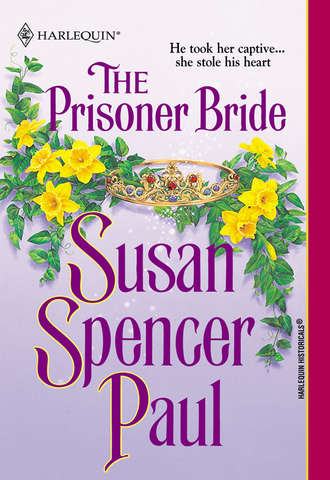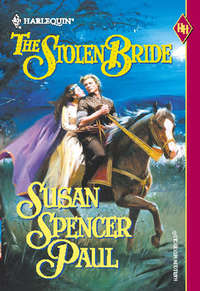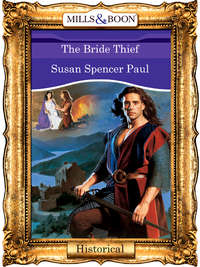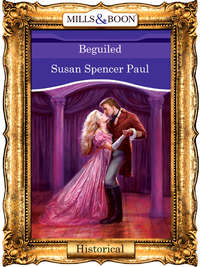
Полная версия
The Prisoner Bride
The family spent every evening together in the great room, and much of the rest of the day, as well. Each member had a favorite spot. Uncle Aonghus liked to sit near the shelf that was set against the far wall and read from one of his favorite bound manuscripts, which were always kept there. Glenys sat near the fire, usually plying her needle on whatever needed mending, from clothing to curtains, and across from her, also near the fire, Uncle Culain would be sitting at the chess table, moving from one chair to the other, playing a game against himself, just as he was doing now. Aunt Mim and Aunt Wynne liked to sit near the tall windows, gazing out into the gardens and courtyard, chattering away and looking into their special box, giggling and exclaiming over each new discovery. They were in their chairs now, bent over the plain wooden box, gazing at the contents within.
“What could this be?” Aunt Mim said wonderingly, lifting a small, thin package up into the light, showing it to Aunt Wynne. “What do you think, dear?”
Aunt Wynne examined the papery object more closely, squinting to read the red letters printed boldly across it. “B-a-n-d–A-i-d,” she spelled slowly. “Hmm. But I’m sure we’ve seen this before…whatever it may be.”
“No, dear,” Aunt Mim chided, setting the object back into the box and closing the lid. “The box never offers the same article twice. You know that.” She lifted the lid and looked inside. “Oh, look! Now isn’t this pretty?”
“Oh, in truth, Sister, it is,” Aunt Wynne agreed, reaching one beautifully delicate hand into the box to lift out a long strand of pearls. “How lovely. Such a shame we can’t keep them for Glenys. She has the coloring for pearls. We’ve never looked well in them,” she said woefully, then, with a sigh, let the luminous strand slide back into the box. “When will we ever get the key?”
The key was what Aunt Mim and Aunt Wynne spent hour upon hour, day upon day searching for. The wooden box offered up mysteries that Glenys felt uncomfortable thinking upon—of all the oddities at Metolius, it was by far the most unsettling—but its real purpose, she had ever been told, was to one day offer up an ancient key that, like the Greth Stone, had been lost to the Seymour family. It had been hundreds of years since the mysterious key had been placed in the box and sent…well, to wherever it was that things disappeared to when placed there…and various Seymours had been trying to get it back ever since. The key box was opened and closed dozens of times during a single day, offering up small, strange objects for observation, but it hadn’t yet yielded the key. Glenys didn’t even know what the key was for or what it was meant to unlock, and she wasn’t entirely certain that her aunts and uncles knew, either, but the quest was a pleasurable way for them to spend their afternoons, and the anticipation of one day finding the key never seemed to wane.
“Mim,” Uncle Aonghus said gently as his sister began to open the box once more. “Glenys is about to leave us.”
Aunt Mim, Aunt Wynne and Uncle Culain all stopped what they were doing and stood.
“Oh, Glenys, dearest,” Aunt Mim said with distress, moving toward Glenys with one of her long, elegant hands stretched out. “Must you go now? It will be so long a time before you come back to us.”
Glenys took her aunt’s hand with care, feeling, as she ever did, the great difference between her own sturdiness and the delicate loveliness of her relatives. “There’s no need to be overset, Aunt Mim,” she reassured her. “I’m only going to the bank, and Dina with me.”
Aunt Wynne joined them, tears filling her bright blue eyes. In her hands she held Glenys’s warmest cloak. “But we shall miss you so greatly,” she said, setting the heavy woolen garment about Glenys’s shoulders. “You must take care in all things, dearest, and never forget that you’re a Seymour. A true Seymour, even though your mother was of the northern people and, like them, so very practical. But that couldn’t be helped, and a dear, good wife she was to our brother Arian.” She nodded, and Aunt Mim and Uncle Aonghus and Uncle Culain, who had left his chess game to join them, all nodded, too.
“But—” Glenys began, only to be interrupted by Aunt Mim, who’d begun to lace up the collar of Glenys’s cloak.
“Your aunt Wynne is quite right,” she said, sniffling and clearly striving not to weep. “You and Daman are Seymours in every way that matters, though you can be so stubborn about accepting that certainty,” she said chidingly, reaching up to adjust the plain silver circlet that sat atop Glenys’s braided auburn hair. “But you can’t run away from the truth forever. Oh, Wynne, where is the stone? She cannot go without it.”
“Here, in my pocket.” Aunt Wynne fished about in the apron that hung from her girdle, at last producing a small, white stone that Glenys recognized at once.
“Oh, no,” she murmured, “I can’t take it with me. Please, don’t ask me to do so.” She looked pleadingly at her aunts. “I’m only going to the bank, and once I’ve spoken with Master Fairchild I’ll return home—long before the evening meal, I vow. And you know how greatly it worries me to take anything…special…out of Metolius.” Merciful God, the very last thing she needed was to have one of Aunt Mim’s and Aunt Wynne’s stones glowing on her person. Despite their small size, the white rocks could put out an astonishing measure of light. Glenys had even taken to searching her aunts before each outing just to make certain they didn’t have one absentmindedly hidden somewhere. She could only envision the trouble that would ensue if one of her aunts’ pockets should start glowing in the midst of St. Paul’s during Mass. “I’d not be able to forgive myself should I lose it.”
“Oh, we won’t mind,” Aunt Wynne said cheerfully, bending to slide the stone into a small pocket within Glenys’s cloak. “We have so many of them, and you’ll need this while you’re gone.” She leaned forward to kiss Glenys on the cheek. “Oh, it’s such an exciting time, dearest, but we will worry for you so. Come home to us soon.”
“Yes,” Aunt Mim agreed, kissing Glenys’s other cheek and hugging her. “Just as soon as you possibly can.”
“I’ll be home in two hours,” Glenys murmured helplessly as she was enfolded in the embrace. “Less than two hours, I vow.”
“Leave her be a moment, Mim,” Uncle Culain chided, moving forward. “Glenys can’t leave without my gift.”
Another offering? Glenys’s heart sank, especially when she saw what Uncle Culain held in his hand. It was his most prized possession, the lone remaining piece of an ancient chess set—the queen. It had been a very odd set, if the intricately carved lady was anything to go by. She was fashioned out of dark red wood, and looked much more like a pagan goddess than a proper queen, with her hair unbound and flowing down to mingle with her long, druidic robes. Her feet were bare, her crown was a wreath of twined flowers and leaves, and her eyes, made of amber, glowed as if a candle burned behind them. Uncle Culain carried the piece with him everywhere, speaking to her as if she could hear him, and even kept her beneath his pillow when he slept. It was impossible that he would part with the chess piece, even for the short while that Glenys would be gone.
“No, Uncle Culain,” she said desperately, pushing his hand back. “I could never take your good lady, not for any reason.”
“But you must,” he insisted. “You must, for she is the only treasure Caswallan will bargain for. He would not part with the Greth Stone for any measure of wealth or fear, but for her,” he said, gently placing the small wooden figure in Glenys’s palm, “he will gladly give it to you.”
“Caswallan?” she said with confusion. “Uncle Culain, I’m only going to the bank. I’ll not be journeying to Wales for another month at the very least. I’ve already arranged to wait for Daman and his men. You know that.” She looked about her at each delicate, lovely face, aunts and uncles alike. “You all know that.”
They nodded and smiled, and began to walk her toward the great room’s entryway, where Dina stood waiting for her. After hugs and kisses from all four of her elderly relatives, she was bustled out of doors, with Dina right behind, and was soon stepping into the waiting carriage with the help of one of the house servants. She looked back, out the open window, as it pulled away, to find her aunts weeping and waving and her uncles nodding sagely and waving.
After so many years, Glenys would have thought that she would be well used to her relatives’ unusual ways, but, presently, she was thoroughly bewildered and amazed. The items they’d given her felt far more like terrible burdens than loving gifts, though she knew in her heart that they’d been given as the latter. The chess piece felt as warm as life in her hand, and Glenys pulled her gaze from the sight of her waving aunts and uncles to look down at it, slowly uncurling her fingers to reveal the little treasure. The beautiful lady was face-up in her grasp, and her amber eyes glowed with that odd, peculiar light that had always unnerved Glenys.
“God’s mercy,” she murmured, quickly pushing the piece into the same pocket as the white stone, praying that neither would cause any trouble at the bank. She looked across to the seat where Dina sat. “Perhaps we should wait until the morrow to visit with Master Fairchild. I vow I am full discomfited.”
Dina’s gaze was sympathetic. “’Twill be well, mistress. The white stones never glow when ’tis so light as today, and the others…you must simply keep them hidden. All will be well,” she promised once more, so convincingly that Glenys believed her. Almost.
They passed the courtyard gates and were soon on the main street heading toward the center of London.
“Pray God you are right, Dina,” she said fervently, sitting back. “I have a most unsettled feeling that we would do very well to finish our business and return home as quickly as may be.”
Chapter Two
“I thought you said that Glenys means ‘fair one,”’ Kieran said, folding his arms across his chest and leaning indolently against the cool bricks of the tavern wall. The wind gusted and the folds of the heavy woolen cape he wore flapped against his leather-clad legs. Casting a glance upward, he saw that the clouds had grown darker, thicker. The day had started as both warm and clear, but a storm was on its way.
“And so it does,” Jean-Marc replied, setting his empty tankard aside on the ledge of the tavern’s open window. “Mistress Seymour was sadly misnamed, I fear. Her parents must have hoped for a different manner of daughter.”
Kieran smiled. “Not with Daman for a son.” He eyed the tall, stately figure of Mistress Glenys Seymour as she made her way from her carriage and into the building where her banker kept his business. “She is just the sort of sister such a brute would have, though her coloring is far milder.”
“Not very mild,” Jean-Marc retorted. “Her hair’s as bright as a sunrise.”
“Nay, ’tis softer, more like a sunset,” Kieran corrected, “though the rest of her appears to be more formidable. I have a great deal of difficulty imagining a soft fellow like Sir Anton scaling that particular fortress, even for love.”
Jean-Marc snorted. “What you mean,” he said, “is that you can’t imagine such a female letting a simpering fool like Sir Anton make the attempt.”
“Nay,” Kieran murmured thoughtfully, “I doubt that, too. She’s not beautiful, of a certainty, but neither is she painful to gaze upon. And her figure is pleasing, i’faith, despite her height. S’truth, Mistress Glenys could do far better for a lover than so delicate a lordling as Sir Anton.”
“I little doubt he cares what she looks like,” Jean-Marc stated, “or whether her figure is pleasing or no. She’s wealthy—that’s what the scoundrel’s thinking of.” When his master made no reply, Jean-Marc glanced up at him and asked, “You didn’t believe Sir Anton’s foolish tale any more than I, did you?”
Kieran shook his head. “I didn’t believe a word of it. He was as clear a liar as I’ve ever set eyes upon.”
“Yet you’re still determined to take Mistress Glenys away and hold her prisoner in York, waiting for Sir Anton to fetch her?”
“Aye.”
Jean-Marc spat on the ground and uttered a sound of unhappiness. “’Tis a fool you are, by God! You risk your neck—and mine—only to spite Sir Daman. And to what purpose? Naught that you do to him can give your sister back all that she’s lost because of him, or return the joy he took from her.”
“Mayhap not,” Kieran said softly, his gaze held fast to Mistress Glenys’s carriage, most specifically on the coachman and lone manservant, who already began to look weary and bored with their waiting, “but I can make him know misery, as he made Elizabet know it, and I can make him know what ’tis like for his beloved sister to be in the power of another. But never fear, Jean-Marc,” he added, glancing at his companion, “I mean Mistress Glenys no harm, and well you know it. Her heart and person will remain untouched and pure—at least until Sir Anton comes to take her away. After that, Daman must worry anew.”
Jean-Marc uttered a loud snort. “You? Turn a woman over to a knave who might do her harm?” He laughed. “Never. Not even a woman like that who’s tall enough and surely strong enough to bash Sir Anton on his puny head. Gawd’s mercy. Tell me another tale, m’lord.”
Kieran scowled at his grinning manservant, but said nothing. The truth of it was that Jean-Marc knew him too well. The thought of leaving Mistress Glenys prey to whatever Sir Anton desired—her fortune, gained through forced marriage, most likely—tickled at the edges of what there was of Kieran’s small conscience. Not enough, howbeit, to keep him from carrying out the plan Sir Anton had laid before him. The chance at having revenge on Daman Seymour was far too compelling to make Kieran change his mind.
There were few people that he had loved in his life, but among those dear few, and assuredly most prominent, were his parents and brothers and sisters. He was, he supposed, a fortunate bastard, if any man basely born might be called thus. His parents—both mother and father—openly acknowledged him, as did his various grandparents, aunts, uncles and half siblings. Indeed, he knew himself to be well loved by all sides of his family, and had been raised by his stepfather as if he were his natural child. Aye, Kieran was fortunate, especially after his many years of wandering and troublemaking. Time and again his family had rescued him from imprisonment, hanging or worse. Time and again they’d pleaded with him to put his restlessness aside and settle down at the small estate that had been provided for him. And time and again, when he disappointed them, they continued to wait with open arms. He didn’t deserve such a family, and certainly not such a long-suffering one. There was only one way in which he was able to make himself worthy, and that was by his loyalty and his own love for them.
This was what drove him to seek revenge against Daman Seymour. Sir Daman, so handsome and celebrated, had caused Kieran’s youngest sister, Elizabet, to fall so deeply in love that she had set all of her usual good sense aside. She had believed that Daman would wed her; Kieran knew full well how easy it was to make a sheltered young maiden believe such as that. In her innocence, love and trust, Elizabet had given herself to Daman, and Daman, the accursed knave, had soon thereafter abandoned her, despite knowing that she had conceived his child. Not even the fear of Kieran’s powerful stepfather, Lord Randall, had kept the fool from so ignoble a deed, though perhaps Daman had known, and rightly so, that Elizabet’s pleading would keep her father from having Daman run to ground and thrown in prison. Shame had done its equal share in convincing Lord Randall to leave the matter be. Elizabet’s pregnancy had been well hidden, though that, in the end, hadn’t been necessary. Grief over the abandonment of her faithless lover had driven her to illness, and she’d lost the child but a few months after it had been conceived.
That had been five months ago, yet Elizabet remained inconsolable. During the few days Kieran had spent with her at his stepfather’s estate, she’d done naught but weep, so wretchedly miserable that Kieran’s own heart had felt riven. He’d sworn then that he would repay Daman Seymour for what he’d done to the dearest, sweetest girl on God’s earth, and had been searching for a way to fulfill that vow since. Sir Anton and his offer of employ had fallen like a gift into Kieran’s lap.
“Aye, you’ll never let Sir Anton take Mistress Seymour away,” Jean-Marc said with surety. “Especially not once she’s fallen in love with you and pleads with you not to abandon her.”
“I’ve abandoned a great many others, despite their pleading,” Kieran replied evenly, not contesting the fact that Mistress Glenys Seymour, and her little maid, Dina, as well, would fall in love with him. Women—no matter their age, birth or status—always fell in love with him, and had been doing so since before he’d turned fifteen. It couldn’t be helped, only acknowledged and dealt with. He had known when he’d accepted Sir Anton’s task that Mistress Glenys’s certain passion for him would complicate things. Just as Jean-Marc had said, she would most likely do as others before her and plead with Kieran not to leave her, especially if he held her prisoner in York for more than a few months. But his heart, despite his intense admiration of females in general, had never been swayed by any woman’s words, except perhaps for those spoken by his mother and sisters. He was well used to gently turning ardent females aside. It would be an outright falsehood to say that he’d avoided breaking more than a few hearts during his years of wandering, but Kieran had been careful never to leave a woman as Sir Daman Seymour had done, either with child or in such despair that death seemed preferable to life. And Daman’s sister was no exception.
Nay, Kieran’s revenge must be upon Daman alone, else it was of no value. As to Mistress Glenys, he would keep her safe and comfortable while she was imprisoned in Sir Anton’s keep in York, and he would make certain that Sir Anton treated her well afterward, neither forcing her into marriage nor keeping her from her family. As for himself, Kieran would rebuff her declarations of love as gently as he might and do whatever he could to discourage such feelings from the very start.
Fortunately, Mistress Glenys herself would make the task easier. If he’d been attracted to her, Kieran would have found it difficult indeed to keep from seducing her. He’d never fallen in love, but women were assuredly his weakness. Mistress Glenys, however, had the look of a safe woman, which was to say that she wasn’t the kind of female Kieran usually preferred. She was…square, he supposed one might say. Angular. It was an odd way to describe a woman, but very apt for Mistress Glenys. And despite the evidence of delightful curves beneath her surcoat, she was also too thin. Unless her clothing possessed some kind of magical powers in hiding what lay beneath, Kieran could detect none of the sweet, soft plumpness that he best loved in his women. Nay, Mistress Glenys was all tallness and bones and strength, a stout, healthy female who looked as if she could put the fear of God into a great many men—though Kieran didn’t count himself among them.
“She’ll be out soon,” he said.
“Aye, in but a few minutes,” Jean-Marc agreed. “Very prompt is Mistress Glenys Seymour.”
It was true. They’d been watching her, as well as ferreting out information from those who gladly imparted it for gold, for only three days, yet already Kieran knew a great deal about her life—and none of it very exciting. She was twenty years old, almost beyond the acceptable age of marriage, and living with her elderly relatives in one of the stately palaces built on the Strand. She attended Mass with her aunts and uncles each morning, and each afternoon went out into London’s center to direct the many Seymour family businesses, always devoting at least one day each week in speaking to their banker, Master Fairchild. Each evening she returned to her grand family dwelling, the main gates shutting firmly behind her, locking her and her family and servants safely inside until the following morn.
He’d seen no visitors arrive in that time, no suitors, no neighbors or acquaintances. In three days nothing about Glenys Seymour’s life had varied. Indeed, it had all been so incredibly, unrelentingly dull that Kieran couldn’t help but wonder how a young woman—even a serious, modest young woman like Mistress Glenys—could bear it. As well, it wasn’t very wise for a wealthy young woman to keep such a regular and expected schedule. She made it almost too easy for kidnappers to take her. He was surprised that no one had tried it before now, for surely her family would willingly pay a large ransom for her return. There was, of course, the thought of the lady’s brother, Sir Daman, to dissuade most knaves from even contemplating such a crime. The thought made Kieran smile.
“It’s time,” he said, casting one last glance at the ever darkening sky overhead.
Jean-Marc nodded and began to unlace the cloak he wore. “I’ll be waiting around the corner, then, ready to trade clothes with the coachman.”
“And I’ll go and fetch him and the manservant,” Kieran replied, adding as he walked away, “Don’t strike too hard this time, Jean-Marc. I want neither of them hurt. There’s no need to rush. We’ve plenty of time. Everything will go off most easily, I vow. Trust me.”
Jean-Marc’s low laughter filled the increasingly chilly air, accompanying Kieran as he made his way.
“Hurry, Dina,” Glenys said insistently as they made their way out of the building where Master Fairchild kept his banking business. A servant held the large wooden door open for them, bowing as they passed. “I want to be home as soon as we may.”
Picking up her skirts, she hurried out to the street toward their waiting carriage. Dina’s rapidly following footsteps spurred her on, and Glenys barely cast a glance at their manservant, John, as he opened the door, lowering his head and tugging his forelock.
Despite the brief exchange, Glenys knew at once that something was wrong. But she had already stepped into the carriage before her body responded to what her brain had told her—that John wasn’t that tall or well-muscled.
“Dina,” she said, turning to step back down again, only to have Dina shoved so forcibly inside that they both fell against the seat. Dina screamed loudly in Glenys’s ear and clutched at her tightly in panic, making matters worse.
Everything happened so quickly that by the time Glenys had righted both herself and Dina, it was too late. The imposter who’d taken John’s place had lifted himself easily into the carriage and shut the door behind him, and the carriage had been set into motion.
“What—!” Glenys uttered.
The man sat in the seat opposite them, pulling a long, sharp, shining knife from beneath the folds of John’s tunic—for he wore it over his own clothing—and held it up.
“Be quiet for now, mistress,” he said in a calm but commanding tone. “Have no fears, for if you do as I say, no harm will come to you or your maid. If you refuse to obey, I’ll make you insensible. And her, as well.” He nodded at Dina, who made a gargled, choking sound and promptly fainted on Glenys’s shoulder.
“We have no money,” Glenys told him, pushing Dina upright with both hands to keep her from sliding to the floor. “I’ve brought nothing from the bank.”
The fiend merely smiled at her—in a ridiculously charming manner that Glenys felt belied the situation entirely.
“I’ve no care for your money, Mistress Glenys,” he replied. “Now heed me, and keep quiet. We’ll be at the city gate soon, and then you’ll have enough to say. Once we’re safe out of London, I’ll explain the matter most fully.”
“At the city gates, I’ll have you—and whoever is driving our carriage—arrested,” Glenys vowed angrily. “What have you done with John and Willem? For that is surely not Willem atop. He’d never—”
The stranger held up a staying hand. “They are both well and unharmed. A little tap to the head, I promise you, is all they suffered. I’ve already arranged for them to be found and safely returned to Metolius. Have no fears for them, but for yourself and your maid. I dislike harming women, but I will do so if I must. We will get through the city gates, either with your aid or without, though you’ll far prefer the outcome if you freely lend your assistance. Understand me well, Mistress Glenys, for I mean what I say. I’ve killed a great many men in my life, and adding two London guards to the number will mean very little to me. I suspect, howbeit, that you would prefer not to be the cause of such bloodshed. Nay, be still.” He held up the knife. “You may speak as much as you like…later.”






